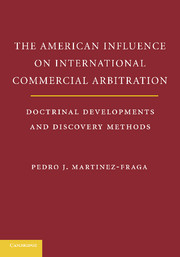 The American Influences on International Commercial Arbitration
The American Influences on International Commercial Arbitration Book contents
- Frontmatter
- Contents
- Table of Citations
- Acknowledgments
- Foreword
- Preface
- 1 Introduction
- 2 The Formation and Transformation of the Status of International and Domestic Arbitration in the United States
- 3 Wilko v. Swan, Scherk v. Alberto-Culver, and Mitsubishi v. Soler: Crafting a Level Playing Field
- 4 Procedural Change and 28 U.S.C. §1782: The Taking of Evidence v. Common Law Discovery
- 5 The Gathering of Evidence v. Common Law Discovery
- 6 What Has Really Happened? The Effects of a Trilogy Examined
- 7 The New Unorthodox Conception of Common Law Discovery in International Arbitration
- 8 And Now How Do We Avoid 28 U.S.C. Section 1782 in International Commercial Arbitration?
- 9 Perjury & Arbitration: The Honor System Where the Arbitrators Have the Honor and the Parties Have the System
- 10 Developments in the Apportionment of Jurisdiction Between Arbitrators and Courts Concerning the Validity of a Contract Containing an Arbitration Clause, and Transformations Regarding the Severability Doctrine
- 11 U.S. Arbitration Law and Its Dialogue with the New York Convention: The Development of Four Issues
- Conclusion
- Appendix A Duelo a Garrotazos
- Appendix B Selected Cases
- Appendix C The New York Convention, The Federal Arbitration Act, and 28 U.S.C. §1782
- Appendix D Amendments to 28 U.S.C. §1782
- Appendix E Selected Rules of Civil Procedure
- Appendix F Geneva Convention of 1927
- Appendix G Selections from the Legislative History of the Federal Arbitration Act
- Index
- References
10 - Developments in the Apportionment of Jurisdiction Between Arbitrators and Courts Concerning the Validity of a Contract Containing an Arbitration Clause, and Transformations Regarding the Severability Doctrine
Published online by Cambridge University Press: 11 July 2009
- Frontmatter
- Contents
- Table of Citations
- Acknowledgments
- Foreword
- Preface
- 1 Introduction
- 2 The Formation and Transformation of the Status of International and Domestic Arbitration in the United States
- 3 Wilko v. Swan, Scherk v. Alberto-Culver, and Mitsubishi v. Soler: Crafting a Level Playing Field
- 4 Procedural Change and 28 U.S.C. §1782: The Taking of Evidence v. Common Law Discovery
- 5 The Gathering of Evidence v. Common Law Discovery
- 6 What Has Really Happened? The Effects of a Trilogy Examined
- 7 The New Unorthodox Conception of Common Law Discovery in International Arbitration
- 8 And Now How Do We Avoid 28 U.S.C. Section 1782 in International Commercial Arbitration?
- 9 Perjury & Arbitration: The Honor System Where the Arbitrators Have the Honor and the Parties Have the System
- 10 Developments in the Apportionment of Jurisdiction Between Arbitrators and Courts Concerning the Validity of a Contract Containing an Arbitration Clause, and Transformations Regarding the Severability Doctrine
- 11 U.S. Arbitration Law and Its Dialogue with the New York Convention: The Development of Four Issues
- Conclusion
- Appendix A Duelo a Garrotazos
- Appendix B Selected Cases
- Appendix C The New York Convention, The Federal Arbitration Act, and 28 U.S.C. §1782
- Appendix D Amendments to 28 U.S.C. §1782
- Appendix E Selected Rules of Civil Procedure
- Appendix F Geneva Convention of 1927
- Appendix G Selections from the Legislative History of the Federal Arbitration Act
- Index
- References
Summary
The doctrinal development of arbitration in the United States in large measure constitutes the rediscovery and renaissance of the venerable principle of party-autonomy. This precept, in turn, certainly cannot be conceptually severed from the juridic dignity accorded to contractual agreements. It followed from the four historical propositions that deemed arbitration to be a second-tier dispute resolution methodology; that an arbitration clause was (i) neither a “free standing” contract separate and distinct from the underlying agreement embodying it, nor (ii) an agreement enjoying equal dignity with commercial contracts of whatsoever ilk.
The doctrinal development of arbitration in the United States in large measure has sought to place arbitration at the same level as judicial proceedings. As referenced, this effort, however, has been undertaken parallel with the transformation of arbitration agreements from the status of a secondary genre of a “binding” contract to one equal in all respects to enforceable commercial contracts. This transformation required sustained analysis of four rudimentary questions.
First, as a matter of substantive federal arbitration law, is an arbitration provision severable from the remaining contract? Second, is a challenge to a contract containing an arbitration clause to be adjudicated by a judge or an arbitrator? Third, is there a federal substantive law created by the Federal Arbitration Act (FAA)? Fourth, is such a law applicable in state as well as federal courts? These four inquiries found final resolution on February 21, 2006, but only after first having been identified, albeit embryonically, on June 12, 1967.
- Type
- Chapter
- Information
- The American Influences on International Commercial ArbitrationDoctrinal Developments and Discovery Methods, pp. 129 - 150Publisher: Cambridge University PressPrint publication year: 2009


